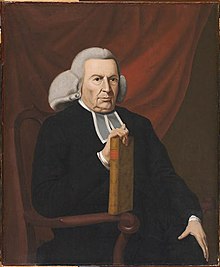The Rev. Dr. Charles Chauncy’s “Letter[s] to a Friend”
Yesterday I took note of a pamphlet that the Rev. Dr. Charles Chauncy published in 1774 about the Boston Port Bill couched as a “Letter to a Friend…” and ascribed to “T.W. A Bostonian.”
The form of a friendly letter to a fellow gentleman was a common trope for framing such commentary on current events and issues. Chauncy had published his first such essay nearly twenty years before.
That pamphlet appeared in August 1755 under the title:
That publication was such a hit, or rather military affairs moved so quickly, that before the end of the year Chauncy added:
In between the imperial crises of 1755 and 1774 Chauncy used the “letter to a friend” trope differently in a couple of his religious pamphlets:
Finally, toward the end of 1783 Dr. Chauncy published:
The form of a friendly letter to a fellow gentleman was a common trope for framing such commentary on current events and issues. Chauncy had published his first such essay nearly twenty years before.
That pamphlet appeared in August 1755 under the title:
A Letter to a Friend; Giving a concise, but just, Account, according to the Advices hitherto received, of the Ohio-Defeat; and Pointing out also the many good Ends, this inglorious Event is naturally adapted to promote: or, Shewing wherein it is fitted to advance the Interest of all the American British Colonies. To which is added, Some general Account of the New-England Forces, with what they have already done, counter-ballancing the above Loss.That was a political and theological response to Gen. Edward Braddock’s defeat at the start of the French & Indian War. As in his 1774 essay, Chauncy adopted the signature “T.W.”
That publication was such a hit, or rather military affairs moved so quickly, that before the end of the year Chauncy added:
A Second Letter to a Friend; Giving a more particular Narrative of the Defeat of the French Army at Lake-George, By the New-England Troops, than has yet been published: Representing also the vast Importance of this Conquest to the American-British-Colonies. To which is added, Such an Account of what the New-England Governments have done to carry into Effect their Design against Crown-Point, as will shew the Necessity of their being help’d by Great-Britain, in Point of Money.Even that title page makes clear “T.W.” was commenting on political matters.
In between the imperial crises of 1755 and 1774 Chauncy used the “letter to a friend” trope differently in a couple of his religious pamphlets:
The Opinion of one that has perused the Summer Morning’s Conversation, concerning Original Sin, wrote by the Rev. Mr. Peter Clark, In TWO Things principally: FIRST, That he has offered that, which has rendered it impossible the doctrine of the imputation of Adam’s guilt to his posterity, should be true in the sense it is held by Calvinists. SECONDLY, That tho’ he pretends to be a friend to the Calvinistical doctrine of imputed guilt, yet he has deserted this doctrine and given it up into the hands of its enemies, as it teaches the liableness of all mankind, without exception, to the torments of hell, on account of the first Sin. To which is added, A few remarks on the recommendatory preface by five reverend Clergymen. In a Letter to a Friend.That one, from 1758, was signed “A.B.”
A Letter to a Friend, Containing Remarks on certain Passages in a Sermon Preached, by the Right Reverend Father in God, John Lord Bishop of Landaff, before the Incorporated Society for the Propagation of the Gospel in Foreign Parts, at their Anniversary Meeting in the Parish Church of St. Mary-Le-Bow, February 20. 1767. In which the highest Reproach is undeservedly cast upon the American Colonies.This one actually had Chauncy’s name on the title page and his own initials at the end.
Finally, toward the end of 1783 Dr. Chauncy published:
Divine Glory Brought to View in the Final Salvation of All Men: A Letter to the Friend to TruthThis pamphlet had no author’s name or initials, but it laid out the liberal theological ideas Chauncy had become known for in Boston. By labeling this “A Letter to the Friend to Truth,” he turned the label from suggesting a friendly private letter between gentlemen into a challenge to the reader. Don’t you want to be a “Friend to Truth”?


No comments:
Post a Comment